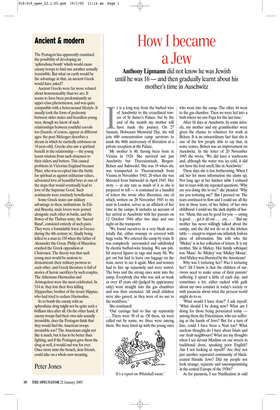Ancient & modern
The Pentagon has apparently examined the possibility of developing an ‘aphrodisiac bomb’ which would cause enemy troops to find one another sexually irresistible. But what on earth would be the advantage in that, an ancient Greek would have asked?
Ancient Greeks were far more relaxed about homosexuality than we are. It seems to have been predominantly an upper-class phenomenon, and was quite compatible with a heterosexual lifestyle. It usually took the form of pederasty between older males and beardless young men, though we know of such relationships between youthful coevals too (beards, of course, appear at different ages: the poet Meleager describes a dream in which he excitedly embraces an 18-year-old). Greeks also saw a spiritual benefit in the relationship — the young learnt wisdom from such closeness to their elders and betters. This caused problems in Victorian England because Plato, who was co-opted into the battle for spiritual as against utilitarian values, advocated love of beautiful boys as one of the steps that would eventually lead to love of the Supreme Good. Such sentiments were routinely bowdlerised.
Some Greek states saw military advantage in these inclinations. In Elis and Boeotia, male lovers were posted alongside each other in battle, and the flower of the Theban army, the ‘Sacred Band’, consisted entirely of such pairs. They were a formidable force in Greece during the 4th century BC, finally being killed to a man in 338 when the father of Alexander the Great, Philip of Macedon, crushed the Greek opposition at Chaironea. The theory was that such young men would be anxious to demonstrate their military prowess to each other, and Greek literature is full of stories of heroic sacrifices by such couples. The Athenians Harmodius and Aristogeiton were the most celebrated. In 514 BC they lost their lives killing Hipparchus, brother of the tyrant Hippias, who had tried to seduce Harmodius.
So to bomb the enemy with an aphrodisiac drug might not be quite such a brilliant idea after all. On the other hand, if enemy troops find their own side sexually irresistible, does the Pentagon think that they would find the American troops irresistible too? The Americans might not like it much, but it has to be better than fighting, and if the Pentagon gave them the drug as well, it would end war for ever. Once more unto the breach, dear friends, could take on a whole new meaning.
Peter Jones













































 Previous page
Previous page